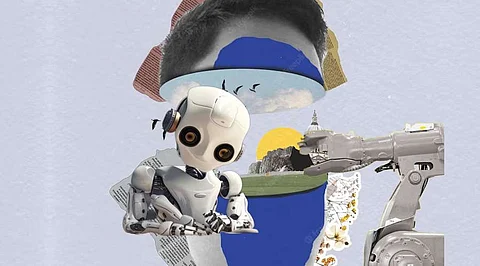

Blockchain technology has emerged as a revolutionary solution in various domains, and its potential to enhance artificial intelligence (AI) is garnering significant attention. Blockchain-helping AI systems can benefit from increased transparency, enhanced data privacy, secure transactions, and improved model accountability, fostering trust and innovation in the AI landscape.
Blockchain technology has rapidly gained prominence in various industries due to its decentralized and secure nature. Simultaneously, artificial intelligence (AI) has emerged as a transformative force, revolutionizing how we process information and make decisions. The convergence of these two technologies opens up exciting possibilities. Blockchain can enhance AI by ensuring data integrity, facilitating secure and transparent transactions, and enabling decentralized machine learning models. By leveraging blockchain's immutability, trust, and consensus mechanisms, AI systems can become more reliable, auditable, and resistant to tampering. This symbiotic relationship between blockchain and AI has the potential to revolutionize industries such as healthcare, finance, supply chain, and more, leading to a future where AI solutions are built upon a foundation of trust and accountability.
Blockchain technology, known for its decentralized and immutable nature, has gained significant attention in recent years. While commonly associated with cryptocurrencies, blockchain has the potential to revolutionize various industries, including artificial intelligence (AI).
Blockchain can address the critical data privacy and security issue in AI systems. By storing data in a decentralized manner across multiple nodes, blockchain prevents unauthorized access and tampering. Additionally, it enables users to maintain control over their data, granting access only to specific AI algorithms or entities, thus ensuring privacy.
Blockchain facilitates secure and transparent data sharing among multiple parties. With smart contracts, AI developers can define the terms and conditions for data access and usage, creating a trusted environment for collaboration. This allows organizations to pool their data resources without compromising individual ownership, leading to improved AI models and insights.
The immutability of blockchain enables traceability and audibility of data, ensuring transparency in AI systems. By recording data transactions and transformations on the blockchain, stakeholders can verify the source, history, and integrity of the data used for training AI models. This feature promotes accountability and mitigates concerns about biased or maliciously manipulated datasets.
Blockchain-powered federated learning combines the benefits of decentralized data storage with collaborative model training. Instead of sending raw data to a central server, participants train AI models locally and share only model updates or gradients. Blockchain maintains a record of these updates, ensuring transparency, integrity, and incentivizing participation, making federated learning more efficient and secure.
Blockchain can enable the creation of decentralized marketplaces for AI models, where developers can sell or license their models directly to users. Smart contracts facilitate automatic and transparent transactions, ensuring fair compensation for model creators. Such marketplaces encourage innovation and foster a diverse ecosystem of AI models accessible to various applications and users.
Blockchain's decentralized nature can provide a secure platform for protecting intellectual property (IP) in the AI domain. By storing and timestamping innovations and creations on the blockchain, developers can establish proof of ownership and protect their IP rights. This empowers AI inventors and encourages collaboration while ensuring proper attribution and compensation.
Blockchain can facilitate the verification and validation of AI models by creating an immutable record of the development process and associated metrics. Auditors and regulators can easily examine the model's architecture, training data, and performance, enhancing trust and accountability in critical AI applications like healthcare or finance.
Blockchain introduces incentive mechanisms, such as tokenization and smart contracts, to encourage participation and contributions in the AI ecosystem. Participants can earn tokens for sharing data, training models, or providing computing resources. These incentives foster collaboration, accelerate research, and democratize AI by rewarding stakeholders for their contributions.
Blockchain can combat counterfeiting by providing an immutable record of a product's journey through the supply chain. Combined with AI technologies like image recognition or IoT sensors, blockchain can ensure the authenticity and provenance of goods. This strengthens consumer trust, enhances brand reputation, and protects against counterfeit products.
Blockchain-based governance models can ensure the decentralized decision-making and accountability of AI systems. Stakeholders collectively determine AI policies, regulations, and ethical frameworks by employing distributed consensus mechanisms. This democratizes AI governance, reduces bias, and creates a more inclusive and transparent decision-making process.
Join our WhatsApp Channel to get the latest news, exclusives and videos on WhatsApp
_____________
Disclaimer: Analytics Insight does not provide financial advice or guidance. Also note that the cryptocurrencies mentioned/listed on the website could potentially be scams, i.e. designed to induce you to invest financial resources that may be lost forever and not be recoverable once investments are made. You are responsible for conducting your own research (DYOR) before making any investments. Read more here.
